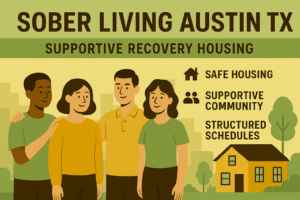Getting sober isn’t easy because it’s difficult to admit that you have a problem, let alone that you’re powerless to alcohol or drugs. However, this is exactly what Step 1 of the 12-Step Program asks of us.
What Are the 12 Steps?
Step 1: We admitted we were powerless over alcohol — that our lives had become unmanageable.
Step 2: Came to believe that a Power greater than ourselves could restore us to sanity.
Step 3: Made a decision to turn our will and our lives over to the care of God as we understood Him.
Step 4: Made a searching and fearless moral inventory of ourselves.
Step 5: Admitted to God, to ourselves and to another human being the exact nature of our wrongs.
Step 6: Were entirely ready to have God remove all these defects of character.
Step 7: Humbly asked Him to remove our shortcomings.
Step 8: Made a list of all persons we had harmed and became willing to make amends to them all.
Step 9: Made direct amends to such people wherever possible, except when to do so would injure them or others.
Step 10: Continued to take personal inventory and when we were wrong promptly admitted it.
Step 11: Sought through prayer and meditation to improve our conscious contact with God, as we understood Him, praying only for knowledge of His will for us and the power to carry that out.
Step 12: Having had a spiritual awakening as the result of these steps, we tried to carry this message to alcoholics, and to practice these principles in all our affairs.
What is Step 1 of the 12 Step Program?
Step 1 of the 12-Step Program is: “We admitted we were powerless over alcohol — that our lives had become unmanageable.”
What Is the Purpose of the First Step in the 12-Step Program?
This first step of the 12-Step Program can be very difficult to internalize because it’s saying that in order to overcome addiction, you have to stop trying to face it head-on. Instead, it asks that you admit that you have no power over alcohol and that your life is out of control.
For many people, this is a hard pill to swallow. Your drug or alcohol addiction may have started as a way to escape, a social activity, or even a medical treatment. As it progressed into an addiction, you may have justified it for various reasons and continued to be blind to the harmful effects it had on your personal life, professional life, and overall health and wellness.
Over time, your addiction may have completely overrun your life, but by that point, maybe all the chaos felt normal. Maybe you never even realized things were unmanageable until you found yourself in a deep, dark pit that you couldn’t get out of.
Admitting that you’re powerless to alcohol is difficult because it means being honest with yourself and recognizing that you have a problem. Going to detox and rehab is often a part of that first step.
The Big Book’s Step 1 is extremely important and essential to recovery. If you can’t admit that you have a problem, then the rest of the steps won’t do you any good. In completing Step 1, you embrace the paradox described in the Big Book: you admit you’re powerless to your addiction, turn away from it, and walk toward the solution.
Ultimately, the purpose of Step 1 is to encourage introspection with honesty and, in turn, empower yourself to take steps toward recovery and away from addiction.
What Are Some Common Myths About the First Step in the 12-Step Program?
- You have to adhere to the Christian belief system to work the 12-Steps. You may hear other people in your group share Christian-based beliefs or thoughts, but that doesn’t mean you have to believe the same. The important part is that you stick to your truth and define for yourself what is meant by the term “higher power.” It is in no way a requirement to be Christian as a 12-Step group member. Everyone is welcome.
- You have to lose everything before you get help. Contrary to popular belief, you don’t have to hit rock bottom or experience a life-changing event such as an overdose to seek help for your addiction.
- You are weak for admitting you are powerless to addiction. The exact opposite is true. It takes a huge amount of courage to recognize and admit that alcohol or drugs have taken over your life. Asking for help is a vital step in achieving sobriety and moving forward in life.
How to Work Step 1: 6 Tips
The best way to work Step 1 is with the guidance of an addiction counselor, sponsor, and/or alongside your sober peers. Working through this first step together can provide support and encouragement when it gets tough. It can also help you remember that you’re not alone and that other people are facing similar life challenges.
While working Step 1 in drug rehab or with a community support group, there are a few things you can do to break through the fog and clearly see the impact of drugs and alcohol on your life.
- Write out some consequences related to your addiction.
First, you can write down some examples of consequences related to your addiction, such as:
- Having feelings of guilt, despair, hopelessness, depression, anxiety, self-hate, or thoughts of suicide
- Experiencing health problems like high blood pressure, sexually transmitted diseases, insomnia, or ulcers
- Having poor performance at work or school leading to loss of employment or poor grades
- Losing parental rights, getting a divorce, or having serious relational problems with friends and family
- Experiencing legal issues, financial problems, or incarceration
- Make a list of ways you’ve been powerless to alcohol or drugs.
Second, you can make a list of some of the ways you have been powerless to alcohol or drugs in the past and how your addiction has caused chaos in your life. For example, you may have:
- Neglected to pay your mortgage and used the money to buy drugs instead.
- Chosen to get drunk instead of attending your son or daughter’s performance, game, graduation, or some other important event.
- Used drugs while at work despite already being warned that if you were caught again, you would lose your job.
You may have become accustomed to keeping these things a secret, so writing them down and sharing them with a support group or other clients in rehab may feel impossible. However, instead of carrying these secrets around with you, unpacking them and sharing actually lifts the burden and gives you the freedom you need to move forward without them dragging you down.
- Speak up at a 12-Step Program.
This can be scary, especially if you’ve never been to a 12-Step meeting before, but it’s an excellent way to live out Step 1. Some 12-Step meetings allow everyone in attendance a chance to speak. This is a great opportunity for new members to introduce themselves and be vocal in a public forum about the fact that they are struggling with addiction.
You may need some time to work up the courage to speak at a 12-Step meeting but it’s helpful to remember that everyone else in attendance has been where you are at one point. Everyone had to take that first step and admit they were an alcoholic or addict. Each time you push yourself outside of your comfort zone and admit to the group that you need help, you are putting Step 1 into action in your life.
- Get an AA Sponsor.
A sponsor is someone who has at least one year of continuous sobriety and acts as a mentor for someone who has less experience in recovery. By getting a sponsor, you are finding a friend, confidant, and role model that will help guide you through the early stages of recovery. He or she can answer questions, provide advice, and offer one-on-one support when things get tough. There are many benefits of having a sponsor, but helping you stay sober is one of the primary perks.
The thought of finding a sponsor may be overwhelming at first, but there are a few things you can do to find a great sponsor, such as attending meetings regularly and making a conscious effort to establish relationships. You can also make a list of qualities you would like to have in a sponsor and approach a person of interest about scheduling a meeting to discuss before either of you commit. If you’re enrolled in a sober living program, you can also ask your house manager or recovery coach for help finding a sponsor.
- Tell someone if you feel like drinking or using drugs.
Just because you have committed to a life of sobriety does not mean you’ll never have the desire to drink again. In the first few weeks and months of sobriety, you’ll likely experience strong cravings for your drug of choice. Unfortunately, this is a natural part of the recovery process and it is difficult for everyone who experiences it.
Allowing yourself to believe that you’ll never crave alcohol or drugs again can contribute to relapse and hamper your recovery. Instead, opening up and being real when you’re craving a drink is putting Step 1 into action and admitting that you can’t do it on your own.
Admitting you’re struggling is an important part of Step 1, but it’s not going to solve the problem on its own. If you’re actively involved in a treatment program, such as medical detox or inpatient or outpatient rehab, treatment professionals may be able to provide medication-assisted treatment and/or behavioral therapy to help you combat cravings and maintain your sobriety. Professional treatment in conjunction with 12-Step meeting attendance will ultimately help you sustain long-term sobriety.
- Tell someone if you have a drink or use drugs.
Lying about relapses and trying to cover them up will only make things worse. Being dishonest about your drinking habits may make everyone else believe you’re in control of your life, but you’re really not. By being honest when you make a mistake, you’re admitting that your life is unmanageable and you need help to stay sober.
Telling your 12-Step group, sponsor, or a treatment professional that you’ve relapsed is difficult because it feels like you’ve failed. However, this couldn’t be further from the truth. A relapse is an opportunity to change and take another look at your treatment, living situation, behavior, and other factors that contribute to your ability to maintain long-term sobriety. Maintaining honest with yourself and others is a key aspect of recovery and will ensure that you can keep living the type of life you want to live.
Get Help to Work Step 1
Working Step 1 of the 12-Step Program isn’t easy, but it’s an important part of your journey to recovery. If you’d like professional help working through the 12 Steps, call Eudaimonia Recovery Homes today at (512) 363-5914 for more information about our IOP, sober living, and continuing care services for people in recovery. We are here to help when you’re ready.




